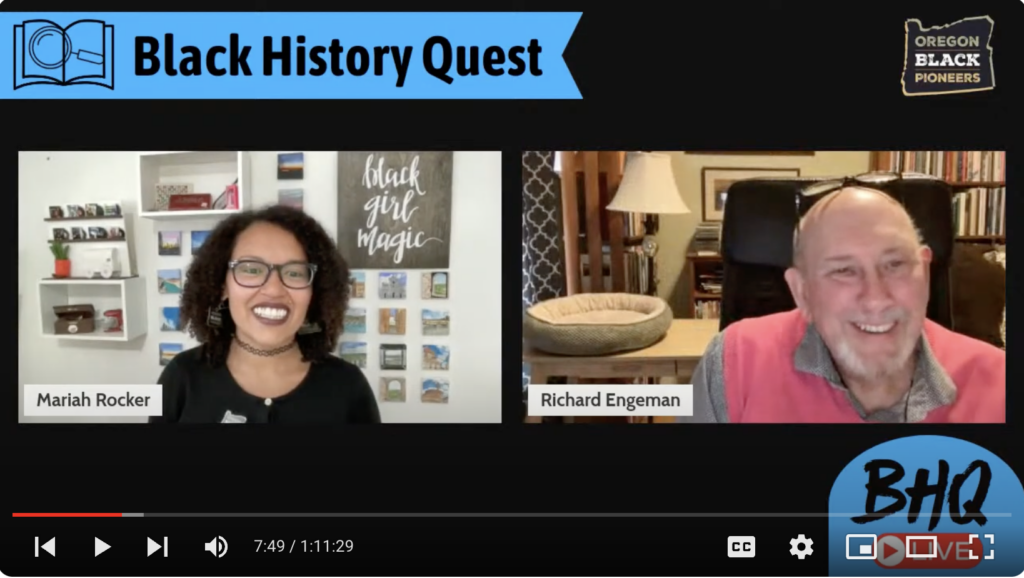Welcome, fellow Pionerds, to the latest edition of The Quest Continues! Your one-stop shop for BHQ updates. We’ve got a recap of the last episode, a quick preview of what’s to come, and an update from last season. Check it out!

Black History Quest: Oregon’s Infamous Poll Tax
In May’s episode, Richard Engeman presented more information about Oregon’s statewide poll tax, or head tax, on “each and every negro, Chinaman, Kanaka, and mulatto.”
Richard’s research suggests that the 1862 poll tax was enacted to support the intention of language in the new state of Oregon’s constitution, language that firmly excluded Black people from living in the state. That the law also impacted Chinese and Hawaiian people indicates that the presence of Black people and the issue of slavery were not the driving impulses behind the poll tax law: a broader racial prejudice was. The tax seems to have been collected in only two of Oregon’s twenty counties, Wasco and Jackson, and the majority of Jackson County’s tax revenue came from Chinese residents.
In the end, the 1862 poll tax was a racially motivated tax that was an expensive irritant to those who paid it, a very minor revenue source for those counties that enforced it. The poll tax allowed state legislators to show their anti-Black constituents that they were taking SOME action to enforce Black exclusion. Like Richard said, “The law is a wart on the state’s history.”
We asked Richard what he would research if he had more time:
“I wish I could have taken more time investigating some of the individual people involved: A. Flowers showed up, and gave me a splendid personal connection with the issues, but I would have liked to follow some others who “paid the price” of the poll tax, and see what happened to, and with, them. Similarly, I wish I could have looked more closely at some of the legislators who pushed for the poll tax, such as Israel D. Haines, who helped add those Chinese and Pacific Islanders to the tax.
For those interested in the Allen E. Flowers family, there are more family photos at the Oregon Historical Society, and they have been digitized and are available online.
There is also a collection of Flowers family memorabilia at the OHS research library, which can be examined there in person.”
Sneak Peek
Next month’s BHQ features Dr. Ramycia McGhee, a professor at Linn-Benton Community College and the first Black woman to serve as a city councilor in Albany. Dr. McGhee will be looking into a 1970’s newspaper article detailing Martha Anderson’s lawsuit against RCA, for stock payment owed to her as an inheritance. Her presentation will try to uncover what the lawsuit was all about.
The Quest Continues…IRL!
The goal of Black History Quest goes beyond uncovering these unknown stories and talking about the process. Ideally, the information uncovered will lead to additional research or expand to something else. Last year, History Investigator Pamela Athearn Filbert presented about the Mystery in Marshfield, the murder of Timothy S. “Frank” Pettis. After digging deep into this tragic history, Pamela wanted to do more than just tell his story.
Pamela is working with the Oregon Remembrance Project to hold a memorial service on the 100-year anniversary of the murder on Saturday, July 6, 2024. The public is invited to join with people of goodwill at Sunset Memorial Park, south of Coos Bay, Oregon, for a memorial service to recover the story of Timothy Pettis, who was brutally murdered on July 6, 1924, on the docks of Coos Bay. Self-guided walking tour brochures will be available at the Coos History Museum and the Coos Bay Visitor Center. An interpreter will be available in the Wells Fargo Bank block from 10:00-11:30 am. The Memorial Service will begin at 1:30 pm at Sunset Memorial Park.
Until next time!


